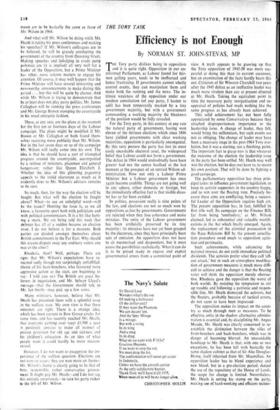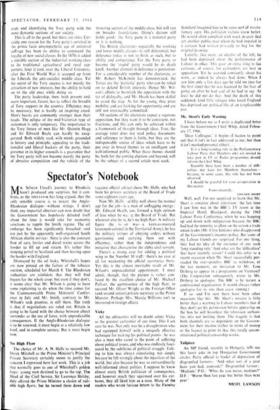THE TORY TASK Efficiency is not Enough
By NORMAN ST. JOHN-STEVAS, MP
rrillE Tory party dislikes being in opposition I and it is quite right. Opposition in our un- reformed Parliament, as Labour found for thir- teen galling years, tends to be ineffectual and hence frustrating. If governments cannot wholly control events, they can manipulate them and make both the running and the news. The in- trinsic weakness of the opposition under our modern constitution (of any party, I hasten to add) has been temporarily masked by a tiny government majority, but with a government commanding a working majority the bleakness of the position would be fully revealed.
For the Tory party, in this century at any rate the natural party of government, having won eleven of the thirteen elections which since 1886 have yielded governments with clear working majorities, opposition is particularly uncongenial. By this very posture the party has lost its most easily encashable electoral asset, the widespread belief that Labour could not form a government. The defeat in 1964 would undoubtedly have been greater had not the centre baulked at the last moment at the prospect of an untried Wilson•ad- ministration. Now not only a Labour Prime Minister but a Labour government has once again become credible. Things are not going well in any sphere, either domestic or foreign, but the immediately effective fact is that visible disas- ter has so far been avoided.
In politics, possession really is nine points of the law, and elections are not so much won by oppositions as lost by governments. Governments are rejected when they lose coherence and make mistakes. The unity of the Labour government has been artificially preserved by its tiny majority: its mistakes have not yet been grasped by the electorate, since they have principally been acts of omission. An opposition does not have to sit mesmerised and despondent, but it must assess the possibilities realistically. What it can do is to be poised ready to expose and exploit governmental errors from a committed point of
view. A myth appears to be growing up that the Tory opposition of 1945-50 was more suc- cessful at doing this than its current successor, but an examination of the facts hardly bears this out. Criticism of Sir Winston Churchill two years after the 1945 defeat as an ineffective leader was much more virulent than any at present directed at Mr. Heath. Taking the equivalent point in time the necessary party reorganisation and re- appraisal of policies had made nothing like the same progress as has already been achieved. This solid achievement has not been fully appreciated by some Conservatives because they attached disproportionate importance to the leadership issue. A change of leader, they felt, would bring the millennium, but such events are not so obliging. The change of leader may have been .a necessary stage in the post-1964 Tory evo- lution, but it was a starting, not a finishing, point. The important fact to grasp now is that whatever the outcome of the election the leadership issue in the party has been settled. Mr. Heath may well win the election, but he does not have to, to secure his own position. That will be done by fighting a good campaign.
The parliamentary opposition has three prin- cipal tasks: to influence government legislation, to keep its activist supporters in the country happy, and to win over the floating vote. Precisely be- cause these aims are conflicting, being a success- ful Leader of the Opposition requires high art. The present opposition has, in fact, fulfilled its first role well. Its campaign on the Finance Bill, far from being 'tomfoolery,' as Mr. Wilson claimed, led to substantial and valuable modifi- cations in the Act which finally emerged. Again, the replacement of the criminal prosecution in the Race-Relations Bill by the present concilia- tion procedure owed much to opposition agita- tion and pertinacity.
Such achievements, while advancing the national interest, do not yield immediate political dividends. The activists prefer what they call 'all- out attack,' but in such an atmosphere modifica- tion of government measures is much more diffi- cult to achieve and the danger is that the floating voter will think the opposition merely obstruc- tive. Rhodesia gave the opposition the worst Of both worlds. By resisting the temptation to stir up trouble and following a patriotic and respon- sible line, Mr. Heath dismayed the activists, but the floaters, probably because of tactical errors, do not seem to have been impressed.
The opposition makes its impact on the coun- try as much _through men as measures. To be effective, unity in the shadow alternative adminisr tration is essential and, by disciplining Mr. Angus • Maude, Mr. Heath was clearly concerned to re- establish the distinction between the roles of front-benchers and back-benchers, which was in danger of becoming blurred. An unavoidable handicap to Mr. Heath is that, with one or two exceptions, he has been left with basically the same shadow cabinet as that of Sir Alec Douglas- Home, itself inherited from Mr. Macmillan. An opposition leader has to blend experience and new blood, but in a pre-election period, denied the use of the repository of the House of Lords, the scope for change is limited. Nevertheless, Mr. Heath is setting his stamp on the party, making use of hard-working and efficient techno- crats and identifying the Tory party with the most dynamic sections of our society.
This is all to the good, but there are risks. Cer- tainly one reason for the Tory party's survival in the prima facie unsympathetic age of universal suffrage has been its ability to command the loyalty of new social classes. In the 1870s it added a sizeable section of the industrial working class to its traditional agricultural and rural sup- porters; later it took over the Liberal Unionists; after the First World War it scooped up from the Liberals the anti-socialist middle class. Yet the secret of the Tory success is not merely the attraction of new interests, but the ability to hold on to the old ones while doing so.
The party leadership, then, both present and, more important, future, has to reflect the breadth of Tory support in the country. Efficiency may be necessary, but is hardly an inspiring creed. Men's hearts are commonly stronger than their heads. The eclipse of the mid-Victorian type of statesman is only temporary. The importance to the Tory future of -men like Mr. Quintin Hogg and Sir Edward Boyle can hardly be exag- gerated. Both widely read, with minds grounded in history and principle, appealing to the tradi- tionalist and liberal backers of the party, their presence in its higher councils is a guarantee that the Tory party will not become merely the party of abrasive competition and the vehicle of the thrusting section of the middle class, but will rest on broader foundations. Dizzy's dictum still holds good: the Tory party is a national party or it is nothing.
The British electorate—especially the working and lower middle classes—is still deferential, but deference today is not to birth as such, but to ability and competence. For the Tory party to become the 'stupid' party would be its death knell. Another element in deference is patriotism: For a considerable number of the electorate, as Mr. Robert McKenzie has demonstrated, the Tories are the 'patriotic' party who can be relied on to defend British interests. Hence Mr. Wil- son's efforts to besmirch the opposition with the tar of disloyalty, and Mr. Heath has been skilful to avoid the trap. As for the young, they prize mobility and are looking for opportunity and are still not irrevocably committed.
All sections of the electorate expect a vigorous opposition, but they want it to be consistent, not fractious, and this can only be achieved within a framework of thought through ideas. True, the average voter does not read policy documents and reference to them is futile, but they are the indispensable source of ideas which have to be put over in broad themes to an intelligent and well-informed public. What those themes should be, both for the coming election and beyond, will be the subject of a second article next week.



































 Previous page
Previous page